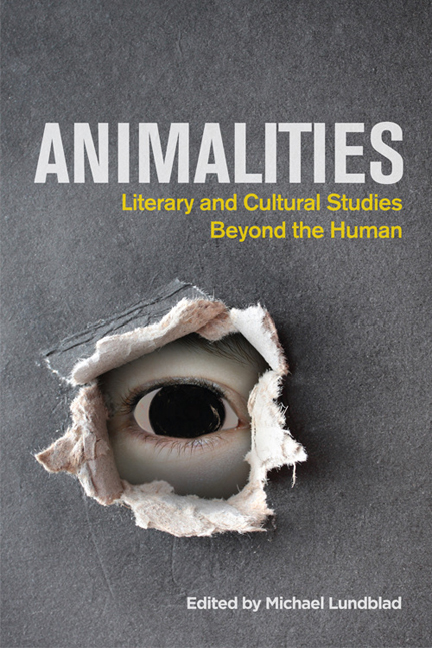Book contents
- Frontmatter
- Contents
- List of Figures
- Acknowledgments
- Introduction: The End of the Animal – Literary and Cultural Animalities
- 1 Each Time Unique: The Poetics of Extinction
- 2 Posthuman New York: Ground Zero of the Anthropocene
- 3 J. G. Ballard's Dark Ecologies: Unsettling Nature, Animals, and Literary Tropes
- 4 Staging Humanimality: Patricia Piccinini and a Genealogy of Species Intermingling
- 5 “Sparks Would Fly”: Electricity and the Spectacle of Animality
- 6 The Nature of Birds, Women, and Cancer: Terry Tempest Williams's Refuge and When Women Were Birds
- 7 Animality, Biopolitics, and Umwelt in Amitav Ghosh's The Hungry Tide
- 8 Looking the Beast in the Eye: Re-animating Meat in Nordic and British Food Culture
- 9 Love Triangle with Dog: Whym Chow, the “Michael Fields,” and the Poetic Potential of Human-Animal Bonds
- 10 Bestial Humans and Sexual Animals: Zoophilia in Law and Literature
- Notes on Contributors
- Index
7 - Animality, Biopolitics, and Umwelt in Amitav Ghosh's The Hungry Tide
Published online by Cambridge University Press: 07 December 2017
- Frontmatter
- Contents
- List of Figures
- Acknowledgments
- Introduction: The End of the Animal – Literary and Cultural Animalities
- 1 Each Time Unique: The Poetics of Extinction
- 2 Posthuman New York: Ground Zero of the Anthropocene
- 3 J. G. Ballard's Dark Ecologies: Unsettling Nature, Animals, and Literary Tropes
- 4 Staging Humanimality: Patricia Piccinini and a Genealogy of Species Intermingling
- 5 “Sparks Would Fly”: Electricity and the Spectacle of Animality
- 6 The Nature of Birds, Women, and Cancer: Terry Tempest Williams's Refuge and When Women Were Birds
- 7 Animality, Biopolitics, and Umwelt in Amitav Ghosh's The Hungry Tide
- 8 Looking the Beast in the Eye: Re-animating Meat in Nordic and British Food Culture
- 9 Love Triangle with Dog: Whym Chow, the “Michael Fields,” and the Poetic Potential of Human-Animal Bonds
- 10 Bestial Humans and Sexual Animals: Zoophilia in Law and Literature
- Notes on Contributors
- Index
Summary
In the contemporary Indian novelist Amitav Ghosh's The Hungry Tide, which is inspired by the German Romantic poet Rainer Maria Rilke's Duino Elegies, a character named Nirmal keeps a personal notebook in the hope that his cousin Kanai can redeem his past. In this novel, Nirmal quotes Rilke's poetry extensively, and this type of mutually implicated and cross-fertilized intertext not only points to a historical sense of place forgotten in the present, but also puts both authors into dialogue with each other. Among the twelve major quotes from Poulin's translation of Rilke's poetry, such thematics as the poetic heir, the historical massacre, Umwelt, and the animal question are brought to bear on each other.
Hailed as a “green postcolonial novel,” The Hungry Tide is set in the Sundarbans – the tide country – which covers “2,300 square miles in Bangladesh and the Indian state of West Bengal” with lush mangroves, representing “the intersection of vernacular culture, place-based behavior, and community.” Etymologically, the word “Sundarbans” is associated with “a common species of mangrove,” meaning “the beautiful forest.” In “Folly in the Sundarbans,” Ghosh points out that due to global warming, this region is devastated by “storm surges,” and “The mangrove forests have historically absorbed the first shock of incoming cyclones,” thus functioning as “the barrier that protects the hinterland.” As a tide country, this (bio)region does not have a fixed entity; rather, it is like a palimpsest ready for metamorphosis. Albeit an area of “mud flats and mangrove islands” – “no ‘pristine beaches’” and “coral gardens” – the Sundarbans is anything but a land of “emptiness” or “illusion”:
the tide country's jungle was an emptiness, a place where time stood still. I [Nirmal] saw now that this was an illusion, that exactly the opposite was true. What was happening here, I realized, was that the wheel of time was spinning too fast to be seen. In other places it took decades, even centuries, for a river to change course; it took an epoch for an island to appear.
- Type
- Chapter
- Information
- AnimalitiesLiterary and Cultural Studies Beyond the Human, pp. 148 - 167Publisher: Edinburgh University PressPrint publication year: 2017



